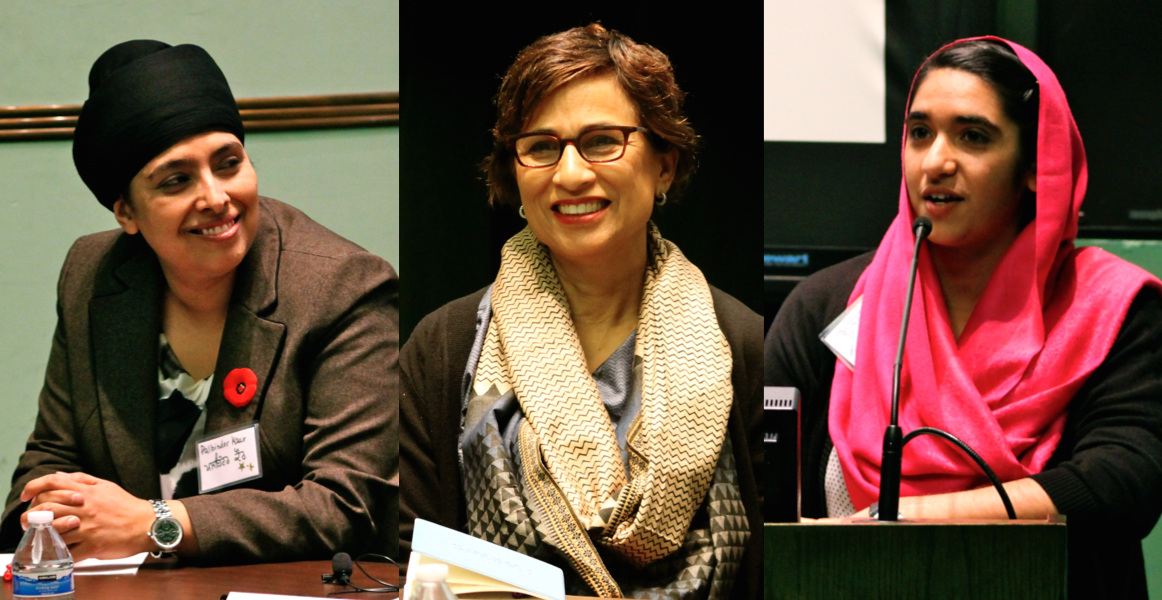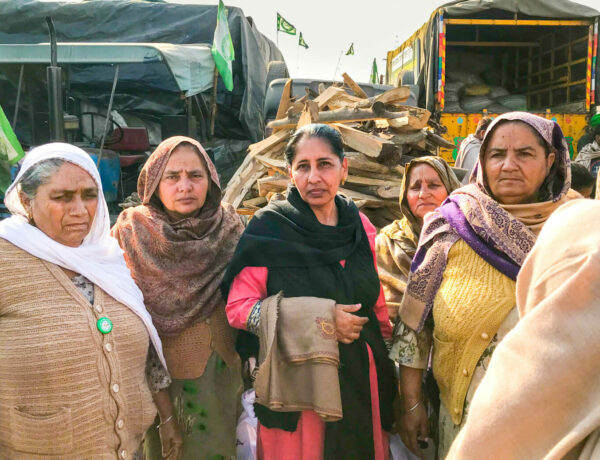Weren’t able to attend SAFAR’s Sikh Feminist Research Conference: Our Journeys: To Know is Not Enough 2014? Don’t worry! Below are audio recordings of all those who presented papers at SAFAR! For biographies of each speaker and more information about their papers, click here.
Read a general synopsis about SAFAR here.
Key Note Panel: Sikh Feminism: What do we Know?
Dr. Inderpal Grewal, Professor of Women’s, Gender, and Sexuality Studies, Yale University
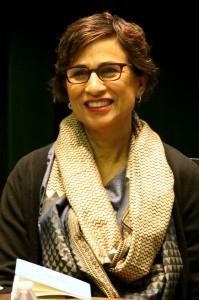
Dr. Inderpal Grewal most recently taught at University of California, Irvine, where she was director of Women’s Studies and of the PhD Program in Culture and Theory. Her research interests include transnational feminist theory, gender and globalization, human rights, NGOs and theories of civil society, theories of travel and mobility, South Asian cultural studies, and postcolonial feminism. She is the author of Home and Harem: Nation, Gender, Empire and the Cultures of Travel (Duke University Press, 1996) and Transnational America: Feminisms, Diasporas, Neoliberalisms (Duke University Press, 2005), and with Caren Kaplan has written and edited Gender in a Transnational World: Introduction to Women’s Studies (Mc-Graw Hill 2001, 2005) and Scattered Hegemonies: Postmodernity and Transnational: Feminist Practices (University of Minnesota Press, 1994). Currently she is working on a book length project on the relation between feminist practices and security discourses. She is also co-editing (with Victoria Bernal, UC Irvine, Anthropology) an edited collection entitled The NGO Boom: Critical Feminist Practices.
Audio Player
Nikky-Gunirder Kaur Singh, Religious Studies Department Chair, Colby College
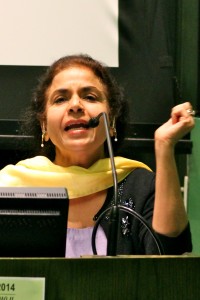
Dr. Nikky-Guninder Kaur Singh is the Chair of the Department of Religious Studies and a Crawford Family Professor at Colby College. She has published extensively in the field of Sikhi, including books Of Sacred and Secular Desire, An Anthology of Lyrical Writings from the Punjab (IB Tauris 2012); Sikhism: An Introduction (IB Tauris 2011); Cosmic Symphony (Sahitya Akademy, 2008); The Birth of the Khalsa (SUNY 2005); The Feminine Principle in the Sikh Vision of the Transcendent (1993); Sikhism (translated into several languages including Japanese) (1993); The Name of My Beloved: Verses of the Sikh Gurus (1995; 2001); Metaphysics and Physics of the Guru Granth Sahib (1981). Her views have also been aired on television and radio in America, Canada, England, Ireland, Australia, India, and Bangladesh. Professor Nikky Singh was born in India, and came to attend Stuart Hall, a Girls’ Preparatory School in Virginia. She received her BA in Philosophy and Religion from Wellesley College, her MA from the University of Pennsylvania, and her Ph.D. from Temple University.
Audio Player
Palbinder Shergill. Q.C, Lawyer
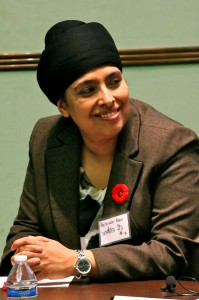
Ms. Palbinder Kaur Shergill completed her law degree from the University of Saskatchewan in 1990. Called to the B.C. bar in 1991, Palbinder is a lawyer and certified mediator. She specializes in the areas of personal injury, civil litigation, and constitutional law. She was appointed to the Queens Counsel in 2012. In addition to practicing civil and personal injury litigation, Ms. Shergill has been the General Counsel for the World Sikh Organization for over 20 years. Palbinder’s work towards the advancement of human rights law in Canada has resulted in her appearing as counsel in landmark human rights cases before the Supreme Court of Canada. Palbinder is currently a Governor for the Trial Lawyers Association of BC. She has served as a Director of the Fraser Health Authority (FHA) Board from 2002-2008 and as National Chair of the Canadian Bar Association’s Administrative Law Section. Palbinder is an active volunteer in pro bono legal clinics, and often serves as a guest lecturer at universities, high schools, and various community organizations, on issues relating to human rights, law, politics, and gender equity.
Audio Player
Panel: Unheard Voices: What Don’t We Know?
“An Attempt at Seditious History: Reimagining Woman through the Archives of the Ghadr Movement” by Kanwalroop Kaur Singh
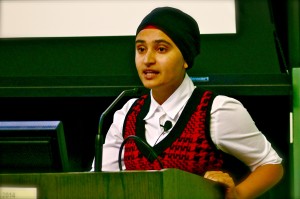
This paper asks and answers two central questions germane to the SAFAR conference: how did women participate in the Ghadr movement, and what will examining this movement though a gendered lens reveal about it? I discuss three examples of the feminine presence in the movement. I examine how the contrasting archival presence and absence of Agnes Smedley and Padmavati Chandra highlights how race and class determine disparate access to power in the movement and its historiography. I discuss how Kartar Kaur Dhillon’s personal narrative stands outside of the archive as a testimony to the silencing and excluding of women within the movement. Finally, I analyze a poem produced by the movement, in which the figure of woman represents revolution and the rewriting of history. I argue that the movement profited from the selective access it gave to women with different racial and class identities, and in this way, reproduced the racist hetero-patriarchy it was itself, subjected to—thus making it a target of and participant in patriarchy at the same time. This double bind is why the movement can be understood as feminine itself, and why it, in turn, understood the figure of woman to be truly revolutionary.
Audio Player
“To Them, My Honour is their Shame: The Experiences of Second Generation Punjabi Females in Canada” by Balpreet Chhokar
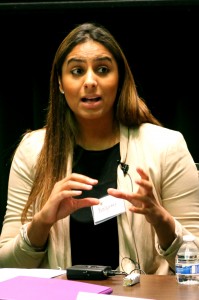
Redefining Honour/Izzat through the Experiences of Second Generation Punjabi Females in Canada. This research is based on the experiences of second-generation Punjabi females who were born and raised in Canada, more specifically the Greater Toronto Area. The research sample included 7 females from the ages of 16-30, all by birth Canadian, all identifying as a part of the Punjabi culture both linguistically and culturally, all whose parents emigrated from Punjab, India. I explored how the migrating parents’ cultural understanding intertwined with the Canadian culture affecting the raising of their daughters. I examined whether the concept of honour is heavily embedded in the transmission of the Punjabi culture.
The findings highlight how being raised in a household that upheld the values and teachings of Sikhi that was distinctly different than the Punjabi culture, allowed the Sikh religion to be used as the means to break the traditional and cultural expectations and to redefine the honour code. The semi-structured interviewed reveal various ways in which females broke the gendered and cultural expectations by using religion to redefine what honour/ izzat meant to them.
Audio Player
“Sikh Identity and Ideas of Cultural Belonging: Violence and Resistance in ‘Anita Rau Badami’s Can You Hear the Night Bird Call?’ ” by Jaspal Kaur Singh
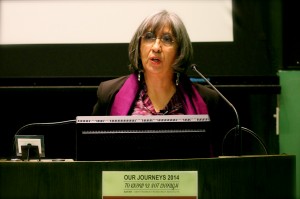
In a post 9/11 world, Sikhs in the diaspora are now visually profiled through media representations as “terrorist look-alike” or as those who “look like terrorist” to be disciplined [and] outlawed” (Jasbir Puar Terrorist Assemblages 175). From being “Saint Soldiers” and “Lions of Punjab,” the transformation of Sikhs into “terrorist” that must be “disciplined” and “outlawed” will be examined in Anita Rau Badami’s Can you hear the Night Bird Call? How do Sikhs, terrorized throughout most of the 1980s and 1990s, attempt to belong to the nation? How does gender configure in the feminization of the Sikhs—both male and female—in India and in transnational geo-political territories? This paper will attempt, in part, to understand Sikhs and their attachment to the sacred in a seemingly post-secular and globalized world.
Audio Player
“Sikh Women During the Punjab Counter-Insurgency (1984-1995)” by Tarnjit Kaur
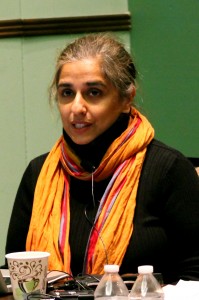 Political violence directed specifically at Sikh women during the period of the counter-insurgency has received limited attention within academia[4], despite widespread reports by international human rights agencies. Highly disturbing episodes unfolded during the period of the counter-insurgency where state security forces were directed to target the families of suspected insurgents, political activists and their sympathizers.
Political violence directed specifically at Sikh women during the period of the counter-insurgency has received limited attention within academia[4], despite widespread reports by international human rights agencies. Highly disturbing episodes unfolded during the period of the counter-insurgency where state security forces were directed to target the families of suspected insurgents, political activists and their sympathizers.
In this work I seek to examine the largely untold narratives of Sikh women as both witnesses, subjects and resistors of violent atrocities, sexual assault, illegal detention, forced estrangement from their families and as agents in the intergenerational transmission of trauma. Through a critical feminist lens I seek to connect individual cases to a meta-narrative of how individual responses to trauma and humiliation affect collective psyche, societal dynamics and influence individual and collective resilience.
Audio Player
“Doli Deconstructed” by Kirpa Kaur and Harroop Kaur
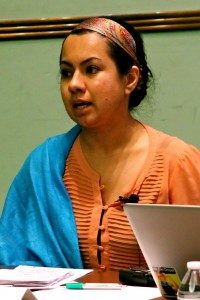
Patriarchy is both reinforced and reproduced through socio-cultural practices and institutions. The institution of marriage (wedding) is one such institution, which when deconstructed, illustrates a number of patriarchal routed rites and constructions (Routledge, 2004). This paper will deconstruct one specific ritual found within a wide array of South Asian and Southeast Asian weddings: doli. This paper will engage in deconstructing doli as per its specific function, nature and traditionalization in Punjabi Sikh weddings.
Through de-constructing doli, the paper will illustrate how this culturally endemic practice is problematic. The paper will expose how doli plays a key role in reproducing and reinforcing patriarchal socio-cultural systems reflected through unchallenged (written and un-written) laws and rules that regulate a woman’s power, autonomy, livelihood, safety, mobility and socio-political-spiritual value. Systems that inevitably strip women of socio-political agency within their domestic spheres before and after marriage; as well as, further defining and deepening inequity within meso and macro levels of society. Thus, rendering women as largely valueless and simultaneously, burden-full.
Audio Player
Panel: Praxis: Knowledge Into Action
“Out of the Ashes: Sikh American Civil Society and the Promise of Gender Equality” by Sangeeta K. Luthra, PhD
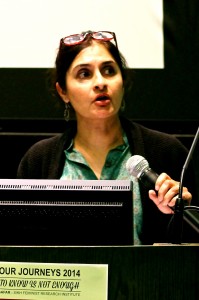
This paper examines post 9/11 articulations of Sikh American politics and ethics, the emergence of a Sikh American civil society, and, in particular, the roles and significance of Sikh women in the emerging political landscape. I will present an overview of what constitutes Sikh American civil society, including a discussion of the distinction between Sikh American civil society and Sikh participation in American civil society. I will present preliminary findings from my ethnographic research on institution building in the Sikh American community. In order to contextualize post 9/11 political engagement, I propose that institution building is a process of “creative agency” in which Sikh doctrines such as seva, sangat-pangat, miri-piri and sant-sipahi, are reframed dialectically with American traditions of civil disobedience, non-violent protest, activism, and coalition-building rooted in the civil rights and women’s movements (Frederick, 2003, p. ix). Finally I will discuss the roles of Sikh American women in the emerging civil society through the following questions: Is the emergence of a Sikh American civil society – defined by an ethics of peace and equality – enabling new and more equal gender formations? To what extent, if at all, is the public and private distinction being disrupted and does this help or hurt Sikh women? Finally, is it possible that the gender equality articulated by Guru Nanak will be re-imagined, redressed, and realized here in this diasporic moment?
Audio Player
“The Right to Rights: An examination of Children’s Rights in Punjab and Ontario” by Jaspreet Kaur
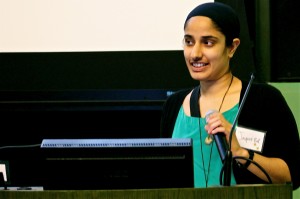
The 19th century was termed the “Century of the Child” by Swedish educator and feminist Ellen Key (Dekker, 2000). There have been many strides in the domain of Children’s Rights but by and large the children of Punjab are struggling to access the rights granted to them (United Nations Committee on the Rights of the Child, 2004). As a PhD student at Queen’s University in Kingston, I am in the process of writing my dissertation around children’s rights in Punjab and Ontario. My project looks at the United Nations Convention on the Rights of the Child (CRC) and how it fails to have influence in Punjab.
In line with the second section of this conference on unheard voices, my presentation will look at the children of Punjab and their lack of participation in the international children’s rights discourse. Although the right to participation is one of the key principles of the CRC, no children were involved in the drafting of it and since its’ ratification by India no children have been involved in the process of interpreting it. Childhood in Punjab is complicated and layered with the varying experience of being Sikh, female, lower caste or tribal. Most importantly, and what my work looks at, is that children in Punjab do not have access to knowledges rooted in text, such as the Convention. The world of text-based realities is accessed by the privileged; the material realities of children in rural Punjab, specifically my village of Butala where I did my fieldwork, are largely outside these bounds. This creates a fundamental disconnect in which the Convention, which was written for children, has no actual influence in their lives. This presentation will explore this disconnect in further detail.
Audio Player
“How do I play my part? The Role of Sikh Female teachers in creating agency for Sikh Students and Families” by Harpreet Neelam and Tina Sidhu
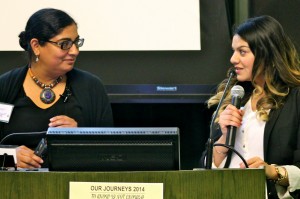
Sikhs are a part of the diversity in Ontario and the focus of this study. This paper will use a critical race and Sikh feminist perspective to answer these questions. When looking at critical race perspective in the education setting, the main objective is not to determine whether racism or in this case “faith” as an “ism” exists but to determine the manner in which racial (or faith) meanings and identities provide the basis for action, (in this case being educational decision making) (Evans, 2007). We also situate ourselves in Sikh feminism where we believe that our purpose as educators is to play our part in the vision that Sikh principles of egalitarianism and empowerment are realized for all, regardless of ability, caste, class, ethnicity, gender, race, sex, and sexual orientation (SAFAR, 2014). Data will be collected through using both our autoethnography narratives of our experiences in the Public Ontario Education system.
Audio Player
“Opening Doors and Breaking the Silence: Sikh Religious Leaders’ Perspectives of Intimate Partner Violence in the South Asian Community” by Susan Kaur Chahal, MSW, BSW, BA, RSW
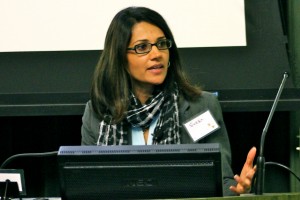
Violence against women is complex issue that has become an increasing social justice concern in Canada and across the global community. There is little research in the area of intimate partner violence research that attempts to understand faith-based perspectives, particularly the views of Sikh religious leaders. Sikh Gurdwaras are predominantly controlled by men and have come under criticism by South Asian women activists for their lack of leadership in addressing the issue of gender violence (Kang, 2006, p. 157).
This research study was conducted in the Lower Mainland of British Columbia. The research objective was to gain insight on the views of violence against women, and what would comprise a community response by interviewing Sikh religious leaders. This research study focused on seven interviews with Sikh religious leaders to understand their perspective on domestic violence in the Sikh community, the role of Gurdwaras in addressing this issue and prevention strategies.
Audio Player
Concluding Remarks: Mallika Kaur
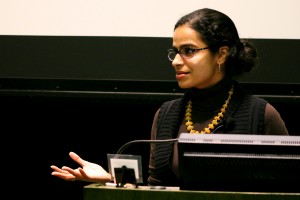
Director of SAFAR, Mallika Kaur
Mallika Kaur is a lawyer and writer who’s foci is on gender and minority issues in the United States and South Asia. She has worked on issues including farmer suicides, feticide, prisoner rights, and family violence. She is the Director of Programs for the initiative on Armed Conflict Resolution and People’s Rights, housed at University of California, Berkeley. She also serves as a pro bono attorney for CORA, a domestic violence agency in Northern California as well as Board Member for SAFAR, the Sikh Feminist Research Institute. Kaur holds a Juris Doctorate from the University of California, Berkeley, and a Master in Public Policy from Harvard University. Kaur is a Founding Board Member of the Sikh Family Center.
Audio Player
Audio Player
Audio Player








 Political violence directed specifically at Sikh women during the period of the counter-insurgency has received limited attention within academia[4], despite widespread reports by international human rights agencies. Highly disturbing episodes unfolded during the period of the counter-insurgency where state security forces were directed to target the families of suspected insurgents, political activists and their sympathizers.
Political violence directed specifically at Sikh women during the period of the counter-insurgency has received limited attention within academia[4], despite widespread reports by international human rights agencies. Highly disturbing episodes unfolded during the period of the counter-insurgency where state security forces were directed to target the families of suspected insurgents, political activists and their sympathizers.





